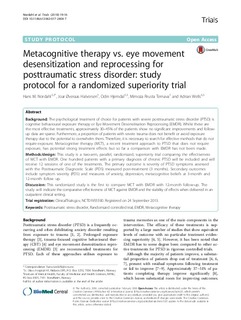| dc.contributor.author | Nordahl, Hans Morten | |
| dc.contributor.author | Halvorsen, Joar Øveraas | |
| dc.contributor.author | Hjemdal, Odin | |
| dc.contributor.author | Rrusta, Mimoza | |
| dc.contributor.author | Wells, Adrian | |
| dc.date.accessioned | 2019-03-19T09:45:00Z | |
| dc.date.available | 2019-03-19T09:45:00Z | |
| dc.date.created | 2018-07-04T12:04:49Z | |
| dc.date.issued | 2018 | |
| dc.identifier.citation | Trials. 2018, 19 (16), 1-8. | nb_NO |
| dc.identifier.issn | 1745-6215 | |
| dc.identifier.uri | http://hdl.handle.net/11250/2590571 | |
| dc.description.abstract | Background
The psychological treatment of choice for patients with severe posttraumatic stress disorder (PTSD) is cognitive behavioural exposure therapy or Eye Movement Desensitisation Reprocessing (EMDR). Whilst these are the most effective treatments, approximately 30–45% of the patients show no significant improvements and follow-up data are sparse. Furthermore, a proportion of patients with severe trauma does not benefit or avoid exposure therapy due to the potential to overwhelm them. Therefore, it is necessary to search for effective methods that do not require exposure. Metacognitive therapy (MCT), a recent treatment approach to PTSD that does not require exposure, has potential strong treatment effects but so far a comparison with EMDR has not been made.
Methods/design
This study is a two-arm, parallel, randomized, superiority trial comparing the effectiveness of MCT with EMDR. One hundred patients with a primary diagnosis of chronic PTSD will be included and will receive 12 sessions of one of the treatments. The primary outcome is severity of PTSD symptoms assessed with the Posttraumatic Diagnostic Scale (PDS) measured post-treatment (3 months). Secondary outcomes include symptom severity (PDS) and measures of anxiety, depression, metacognitive beliefs at 3-month and 12-month follow up.
Discussion
This randomized study is the first to compare MCT with EMDR with 12-month follow-up. The study will indicate the comparative effectiveness of MCT against EMDR and the stability of effects when delivered in an outpatient clinical setting. | nb_NO |
| dc.language.iso | eng | nb_NO |
| dc.publisher | BMC | nb_NO |
| dc.rights | Navngivelse 4.0 Internasjonal | * |
| dc.rights.uri | http://creativecommons.org/licenses/by/4.0/deed.no | * |
| dc.title | Metacognitive therapy vs. eye movement desensitization and reprocessing for posttraumatic stress disorder: Study protocol for a randomized superiority trial | nb_NO |
| dc.type | Journal article | nb_NO |
| dc.type | Peer reviewed | nb_NO |
| dc.description.version | publishedVersion | nb_NO |
| dc.source.pagenumber | 1-8 | nb_NO |
| dc.source.volume | 19 | nb_NO |
| dc.source.journal | Trials | nb_NO |
| dc.source.issue | 16 | nb_NO |
| dc.identifier.doi | 10.1186/s13063-017-2404-7 | |
| dc.identifier.cristin | 1595601 | |
| dc.description.localcode | © The Author(s). 2018, corrected publication February 2018 Open Access This article is distributed under the terms of the Creative Commons Attribution 4.0 International License (http://creativecommons.org/licenses/by/4.0/), which permits unrestricted use, distribution, and reproduction in any medium, provided you give appropriate credit to the original author(s) and the source, provide a link to the Creative Commons license, and indicate if changes were made. The Creative Commons Public Domain Dedication waiver (http://creativecommons.org/publicdomain/zero/1.0/) applies to the data made available in this article, unless otherwise stated. | nb_NO |
| cristin.unitcode | 194,65,35,0 | |
| cristin.unitcode | 194,67,40,0 | |
| cristin.unitname | Institutt for psykisk helse | |
| cristin.unitname | Institutt for psykologi | |
| cristin.ispublished | true | |
| cristin.fulltext | original | |
| cristin.qualitycode | 1 | |

